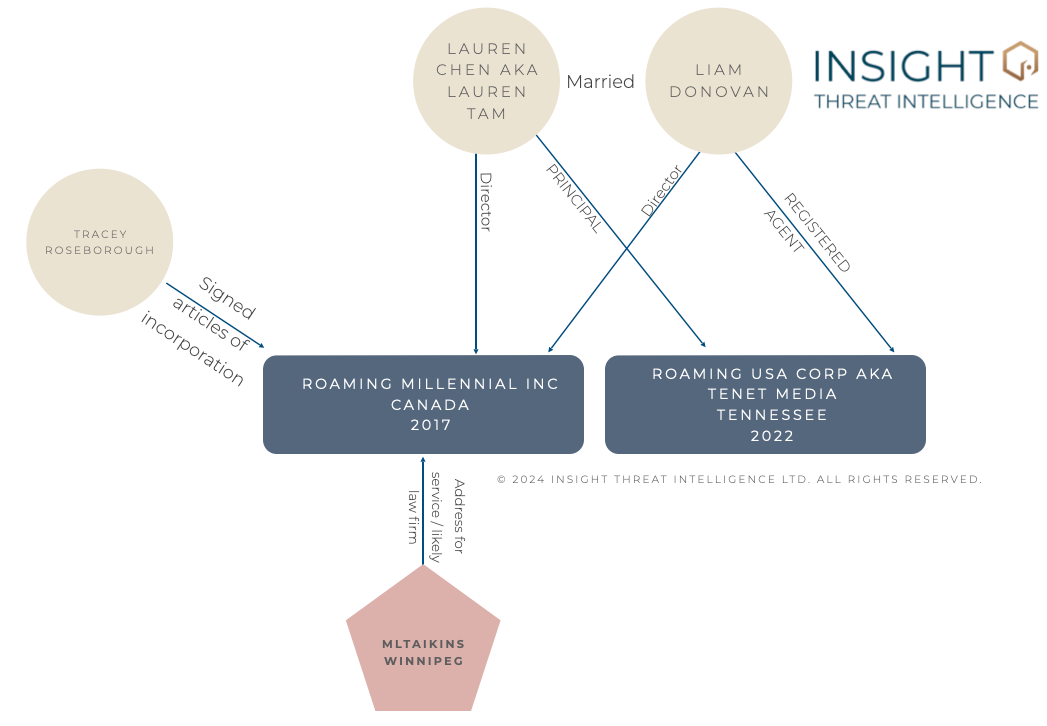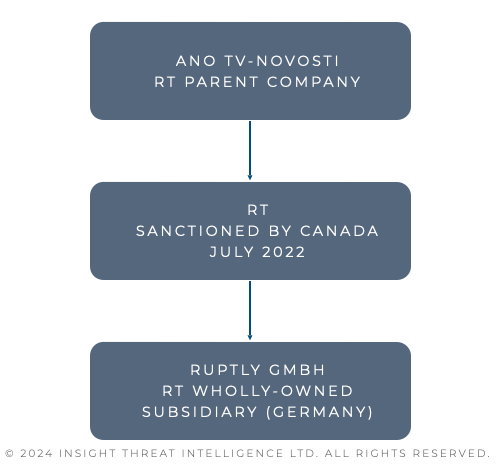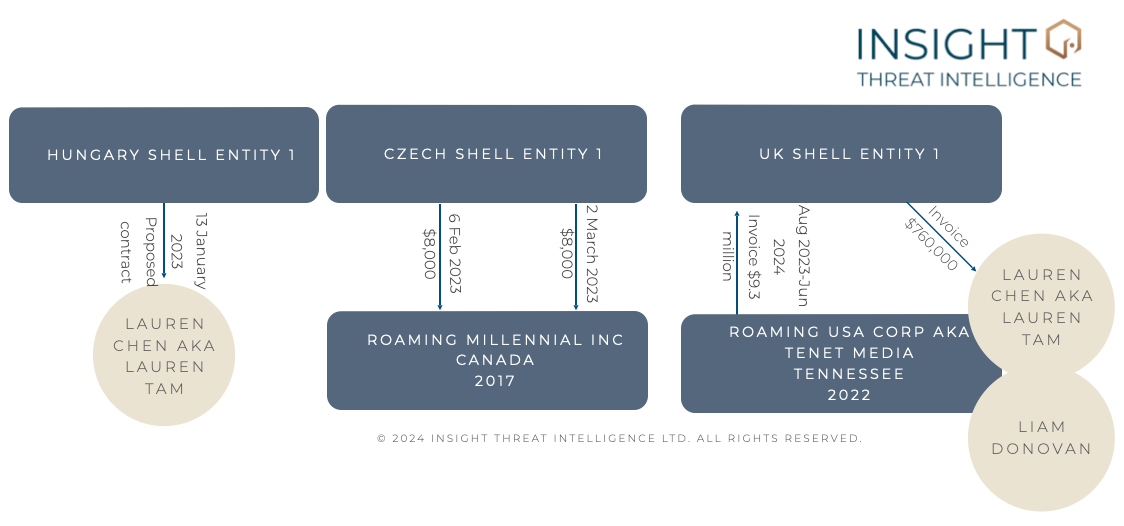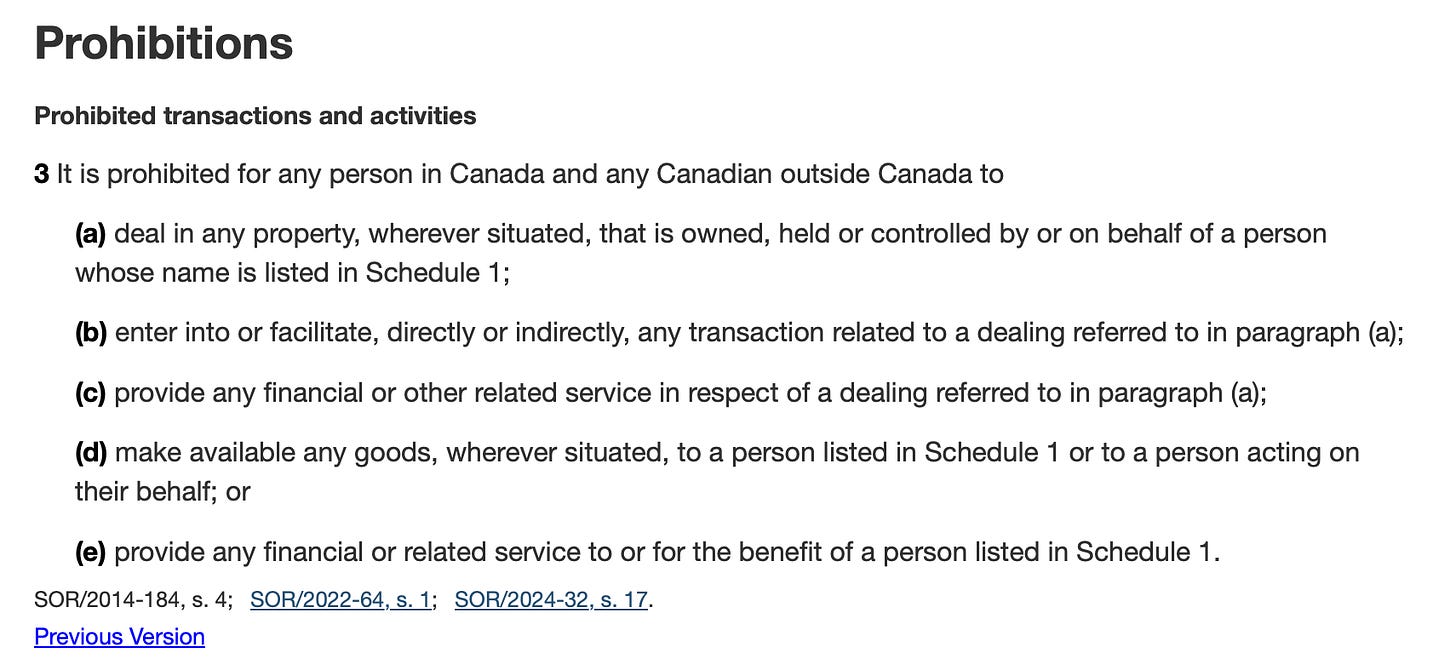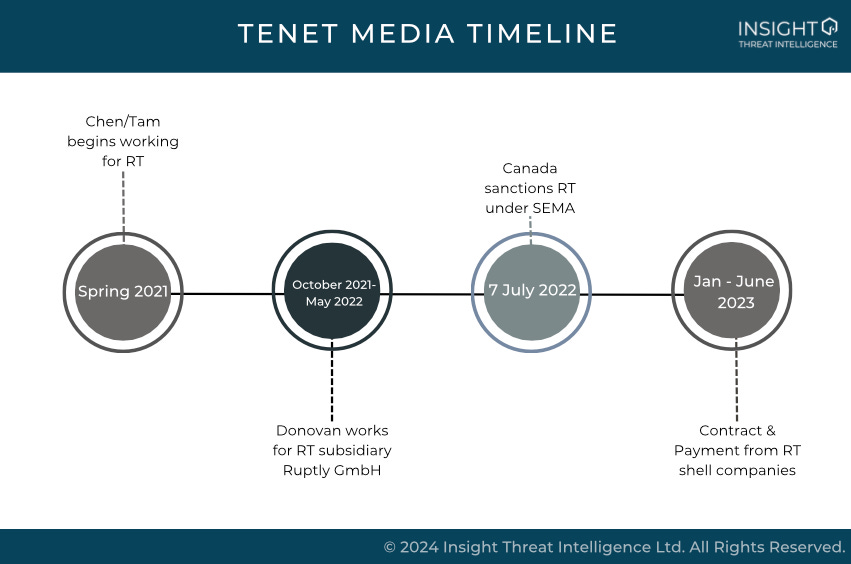Networks of Deception: Russian propaganda, foreign interference, sanctions evasion, and the Canadian connection
Tenet Media, Roaming Millennial, and RT
Hello Insight Monitor subscribers! Welcome to another week of exciting illicit financing news and analysis. Today, we’re looking at the case of Tenet Media, Russian media outlet RT, influencers and foreign interference. This FI (and possibly sanctions evasion) case is fascinating and certainly something we’ll be following for some time to come. I’ve taken a few hours to read through the US indictment and chart the timeline of activities, key players, financial transactions, and corporate structures to the best of my ability. There’s some real nuggets in here, and I’ve visualized some of the information to make it clearer. I’ll endeavour to keep this analysis current as we get more information. As always, thanks for reading, and if you haven’t subscribed, please do! This is a reader-supported publication and one of the only ones in the world that covers illicit financing. Let’s get into it:
In early September, the US indicted two Russian nationals for money laundering and failure to register as foreign principals. The indictment accuses the Russians of setting up a conservative media outlet as a front for Russian propaganda.
The US considers this a form of foreign interference, stating that:
“While the views expressed in the videos are not uniform, the subject matter and content of the videos are often consistent with the Government of Russia's interest in amplifying U.S . domestic divisions in order to weaken U.S. opposition to core Government of Russia interests, such as its ongoing war in Ukraine.”
The indictment claims that US Company-1, a Tennessee-based online content creation company, never disclosed to its viewers that it was funded and directed by RT.1 Russia uses RT to direct disinformation and propaganda at Western audiences. The indicted Russians are both citizens of Russia and employees of RT. There is no indication that the Russians are in the United States or have been arrested.
Tenet Media
The indictment refers to entities as “US Company 1”, “Canadian Company 1”, “Founder 1”, and “Founder 2” and indicates that these companies and founders have a significant connection to Canada. US Company 1 has been widely reported to be US-based Tenet Media. There’s compelling evidence that this is the case, and I recommend you review some of these sources to see that evidence. Journalist Aric Toler does a great job of linking the indictment to open information. You can review his thread here. Plenty of details match. For instance, the indictment says Founder 1 incorporated a US company in Tennessee on or about January 2022. This matches the date and location for the incorporation of Tenet Media, which was incorporated on 19 January 2022 under the name Roaming USA Corporation but changed to Tenet Media a few months later. The business was incorporated by Lauren Tam and Liam Donovan was later added as a registered agent (see corporate document below).
While not currently facing charges in the US, the indictment states that Founder 1 and Founder 2 (widely reported to be Canadians Lauren Chen and Liam Donovan) did not register as the agent of a foreign principal as required by law (the US FARA Act). This article focuses on the role of the Canadians in this foreign interference case.
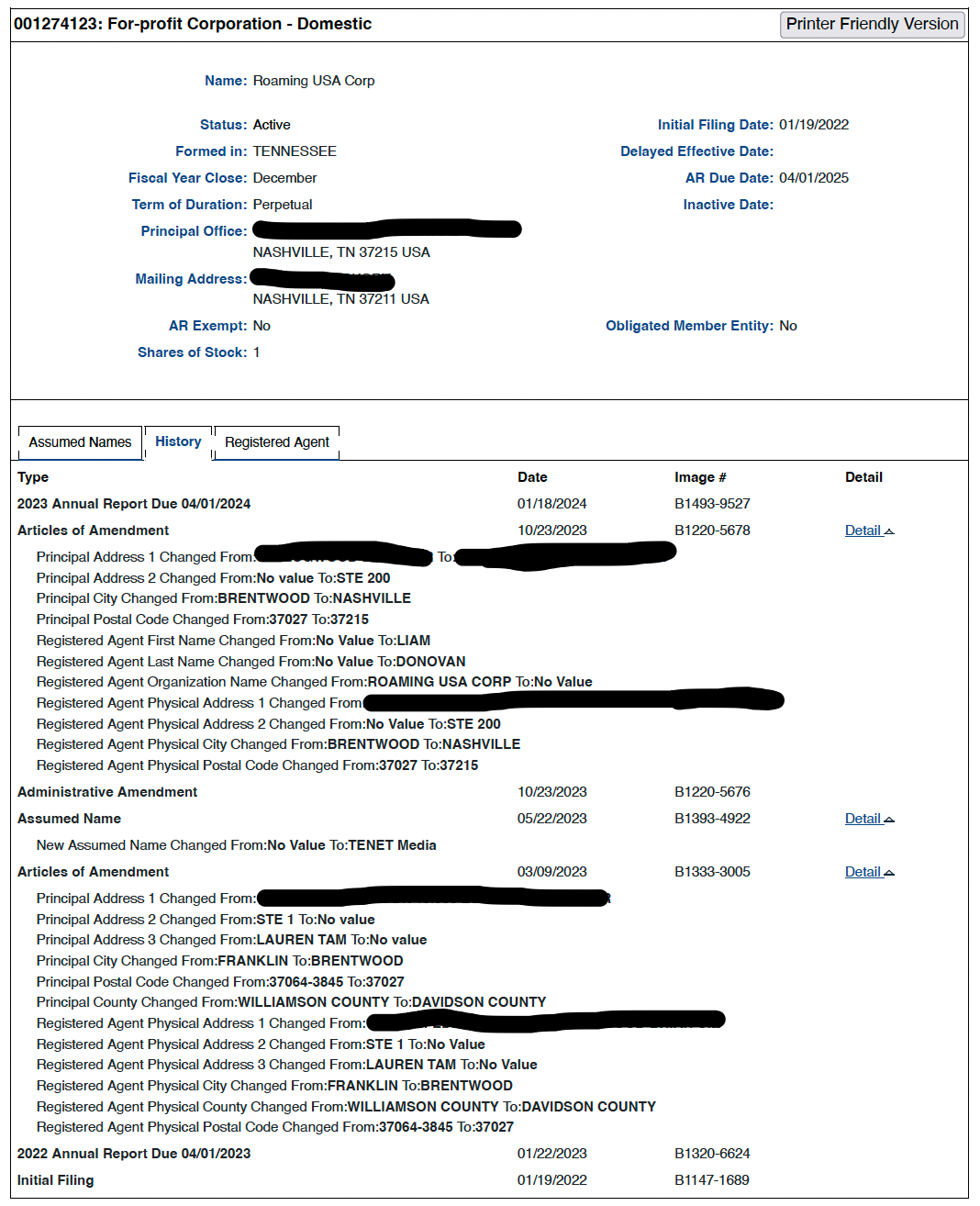
(I’ve redacted addresses for the business — some of which are residential, and one of which is commercial. This is still available through the business registry, but there’s no need to share that info here.)
Roaming Millennial
Now that we’ve established that Tenet media is very likely US Company-1 in the indictment, it’s worth taking a closer look at Chen/Tam, Donovan, and their corporate holdings. Lauren Chen’s real name is Lauren Yu Sum Tam (Lauren Tam, as per the registration for Tenet Media), and Chen/Tam’s husband is Liam Donovan. These two are also directors of the company Roaming Millennial Inc., established in Canada in 2017.2 (Roaming Millennial is also Chen/Tam’s YouTube moniker.) Roaming Millennial is very likely Canadian Company-1 in the indictment. Tenet Media is described as a subsidiary of Roaming Millennial Inc, but I haven’t found any legal documents to establish that fact. Regardless, Chen/Tam and Donovan control both entities.
One name stands out from the corporation documents — Tracey Roseborough. It’s not clear who this is. She originally signed the Roaming Millennial corporate documents when the company was established back in 2017. Roseborough’s address is listed in Quebec, while the corporate documents identify an address for service in Winnipeg. A little digging identifies MLTAikins as the likely law firm for Chen/Donovan and Roaming Millennial in Canada:
This law firm shares a street address and a floor in the building with the address for service on the corporate documents. While several other law firms and consulting companies are domiciled in this building in Winnipeg and likely offer incorporation services, no other firm lists an address on the same floor as MLTAikins.
Because Roseborough’s address is in Quebec, and the law firm is in Manitoba, it seems unlikely that the firm would have used someone from another province to register the corporate documents, which means that Roseborough’s connection is more likely to be a friend or family (Chen/Tam’s mother reportedly lived in Quebec). Why Chen/Tam didn’t sign the incorporation documents herself is a mystery.
Do you want to learn more about financial intelligence and how to use it in research, investigations, and analysis? Our financial intelligence fundamentals course is for you! This course is perfect for people new to financial intelligence and seasoned professionals. Enroll today!
Working for RT
According to the indictment, Founder-1 (aka Chen/Tam) began working for RT in the spring of 2021. From March 2021 until February 2022, Founder-1 (Chen/Tam) wrote articles to fulfill a written contract between Roaming Millennial and RT’s parent organization, ANO TV-Novosti.3 After the Russian invasion of Ukraine in early 2022, Chen was asked to launch a new YouTube channel and recruit high-profile personalities to create Russia-friendly content. Founder-2 (Donovan) also worked directly for RT and with Ruptly GmbH, RT’s German subsidiary, from October 2021 until May 2022.
The Money
The indictment also outlines a series of financial transactions that took place between Chen/Tam, Donovan, their companies, RT and its subsidiary, and shell companies located in:
Czech Republic;
Hungary;
United Kingdom;
Türkiye (two shell companies);
United Arab Emirates (three shell companies in Dubai and Ras Al-Kaimah); and
Mauritius.
The Czech shell company had a website purporting to sell automobile parts but also listed unrelated services (a common practice when trying to obfuscate the fake nature of a shell corporation). Some of these jurisdictions are known jurisdictions of concern for money laundering, both now and in the past.
Between October 2023 and August 2024, Tenet Media received approximately 30 wire transfers from foreign entities to its US bank account, totalling roughly $9.7 million, while they invoiced a UK shell company for $9.3 million. Chen and Donovan also invoiced the UK shell company for their personal fees, totalling $760,000. Tenet Media’s inbound wire transfers ascribe the payments to the purchase of electronics, not a known business line for the media company. In money laundering or other illicit financing cases, a fake reason for the transaction is often included in transaction details.
Criminal Sanctions Evasion?
In July 2022, RT was sanctioned under Canada’s Russia Sanctions (SEMA). Some media reports have suggested that this was a breach of sanctions. Global Affair’s Canada’s sanctions page says the Regulations “impose an asset freeze and dealings prohibition on designated persons listed in Schedule 1, which include both individuals and entities.” The actual regulations are worded a bit more vaguely, omitting the language of broader sanctions.
Whether or not the activities of Chen/Tam and Donovan are covered under Canadian law depends on whether payment for services constitutes dealing in any property held by or on behalf of a designated person (entity) (3(a)). (If this provision applies, b also likely applies.) The drafters intended to effect a broad ban on transactions, but whether a court would uphold this interpretation remains to be seen. The lack of case law for Canadian sanctions is an issue for interpreting precisely what is meant here.
Further supporting the interpretation that “dealing in any property” includes payment for the services is the use of shell companies. Chen/Tam and Donovan are alleged to have been paid by RT, its parent company and subsidiary, through a series of shell companies. RT had to effect payment in this manner because no Canadian or US bank would accept payment for services from RT directly, a sanctioned entity, or its subsidiaries or parent companies. Facilitating the transaction would constitute dealing in the sanctioned entity’s property, so it stands to reason that receiving payment from this property could also constitute dealing.
According to the indictment, the relationship between the Canadians, their companies, and RT does not appear to have ended with the imposition of Canadian sanctions. Instead, Chen/Tam signed a contract to recruit conservative media personalities for a YouTube channel, and Chen was billing RT through Roaming Millennial Inc.
While none of these accusations have been proven in court, the indictment suggests some bad things. Indeed, it goes so far as to accuse Chen and Donovan (through their likely monikers of Founder-1 and Founder-2) of being unregistered foreign principals in the US, so an indictment against them might be forthcoming.
Public Safety Minister Dominic LeBlanc said: “Canada has been working in close cooperation with the U.S. and other allies on this serious matter. While we are unable to comment on ongoing investigations, we are united in confronting Russia’s aggression and subversion against democratic societies and we will not hesitate to take any actions necessary to hold Russian threat actors to account.”
One law that likely does not apply to this case is the Foreign Influence Transparency and Accountability Act. Despite working for a foreign news agency and propaganda outlet, and not declaring that relationship, Chen and Donovan would not have been required to register as foreign principals because this component of the Act only applies to individuals and entities engaged in influencing political and governmental processes:
“The political or governmental processes in question include any proceeding of a legislative body, the development of a legislative proposal, the development or amendment of any policy or program, the making of a decision by a public office holder or government body, including the awarding of a contract, the holding of an election or referendum and the nomination of a candidate or the development of an electoral platform by a political party.”
During the development of Bill C-70, there was discussion about requiring the disclosure of payment by foreign actors for the creation of content (including opinion pieces), but that was not included in the final draft of the bill.
Another issue in terms of a potential prosecution relates to the nature of the information collected in this case and whether it can be used in a court of law. US intelligence is often successfully used in prosecutions, while in Canada, we still encounter the “intelligence to evidence” problem. How the information about the shell companies and their relationship to RT was obtained might complicate matters. On the other hand, payments to Canadian bank accounts create a reliable money trail.
This will undoubtedly be a case to watch and has the potential to set important precedents for both foreign interference and sanctions evasion.
Did you find this article insightful? Share it with a friend!
© 2024 Insight Threat Intelligence Ltd. All Rights Reserved.
This newsletter and its contents are protected by Canadian copyright law. Except as otherwise provided for under Canadian copyright law, this newsletter and its contents may not be copied, published, distributed, downloaded or otherwise stored in a retrieval system, transmitted or converted, in any form or by any means, electronic or otherwise, without the prior written permission of the copyright owner.
RT is a state-controlled television network funded by the Russian government.
Source: Corporations Canada
Chen/Tam has written 25 opinion articles for RT, the same number that Founder-1 wrote for RT, according to the US indictment, further corroborating the Chen/Tam/Founder-1 connection.



